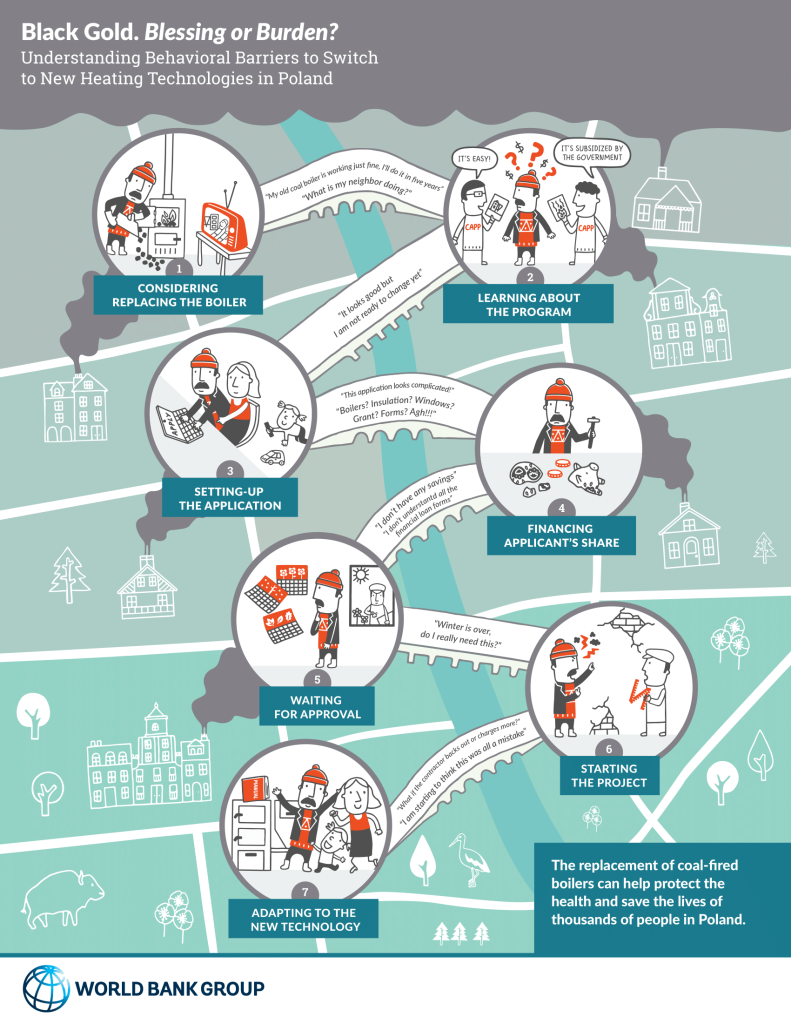 Aerial view of the city of Warsaw, Poland, covered in smog
Aerial view of the city of Warsaw, Poland, covered in smog
Over 3 million households in Poland continue to heat their homes with “smokers”— outdated, inefficient, and heavily polluting boilers fueled by solid fuel, notably coal and wood. Fuel combustion from these boilers, for central heating and hot water, is the main source of poor quality air in the country. According to the World Health Organization, 36 out of the 50 cities in Europe with the most polluted air are in Poland. The air pollution leads to an estimated 46,000 premature deaths each year and annual economic losses of $38 billion to $40 billion.
To address the issue, the Polish government launched the Clean Air Priority Program (CAPP) in 2018—among the largest air-quality and energy-efficiency programs in Europe. CAPP helps single-family buildings achieve more sustainable heating practices through the upgrading of heating devices and thermal retrofitting.
The World Bank has supported the Polish authorities in identifying efficiency gains in the design and implementation of the program. One component of our support was a behavioral diagnostic of heating technology transitions. This was based on the premise that, while a well-designed subsidy might be necessary to support change, it might not be sufficient. Providing only financial incentives to encourage better behavior might not be enough when attitudes and beliefs are deeply rooted.
A homeowners’ decision to upgrade their heating technology—either because they need or want it—is not an easy one. There are a number of barriers that have prevented such investments from taking place, with structural and behavioral factors intertwined in some cases: high upfront costs and no access to affordable financing, limited knowledge or access to newer technologies or fuels, perceived risks associated with new technologies, contractors and actual energy savings, underpriced externalities on CO2 and air quality.
"A homeowners’ decision to upgrade their heating technology—either because they need or want it—is not an easy one."
Such projects are expensive and inconvenient, and temporary fixes are often available. In this current climate of rising energy prices, budgets are stretched thin and the uncertainty of the costs of other fuels causes concern, even if a new boiler consumes less fuel. The project usually requires coordination with several professionals, such as contractors and electricians, who you might not know well and who may not work together. In effect, structural and behavioral factors inhibit action. If ignored, even the best incentive can fall short.
Emotional connections, practical obstacles
The path from recognizing a need or desire to upgrade to adopting a new technology is far from smooth. Many people in Poland have heated their homes with coal for decades, which leads to status-quo bias (why change if my boiler is working fine?) and information gaps (unwillingness to learn about alternatives).

Social norms can discourage interest in new technologies (everyone I know keeps using the old technology, why switch?). Figuring out what alternative heating system to select and weighing the pros and cons of each option can be complicated, including an overload of choices making it difficult to make decisions. Having to hire different contractors and not knowing whom to trust contributes to inaction.
Although subsidies can cover up to 90% of the total cost of installation for low-income households, there’s still a portion that needs to be financed by the applicant. Limited liquidity and low financial literacy can pose a problem.
The Program recommends that households simultaneously improve the thermal efficiency of their homes—by, for example, adding roof or wall insulation. And once a homeowner has “all their ducks in a row”, there is still the waiting period for the new equipment to be installed. It’s a long process before one can benefit from the new boiler and a cozier thermal modernized house.
Fortunately, understanding behavior does not only help us identify problems—and what causes them—but confront them as well.
"Fortunately, understanding behavior does not only help us identify problems—and what causes them—but confront them as well. "
Insights based on this research were used, for example, to simplify the CAPP program structures and application processes, engage supply side actors and mobilize municipalities. This has fed into the evolution of the CAPP, with updates that focus on advancements that broaden demand and embrace the mantra, “keep it simple”.
These insights also helped shed light on the costs of inaction and on the program itself, encouraging action that would challenge existing norms and beliefs. Processes were simplified and more resources were made available to help navigate the complicated journey. Third-party actors like suppliers, retailers, builders, and installers can be engaged to assure a a “whole house” approach.
Policy makers should not ignore the complex process behind these transitions to understand what is needed to generate demand and ultimately facilitate the journey toward more sustainable heating practices. There’s no single path: each transition is unique to the country, population, and technology, and keeping in mind these non-financial factors is needed to get to the end of the transition journey. As Poland’s Clean Air Program has shown, structural and behavioral barriers need to be tackled simultaneously for success, as the program has done through better access to financing, simplified tools and help to demystify the choices and guide homeowners through the process, and continuous and strong information campaigns that aim to inform and change behaviors.




Join the Conversation